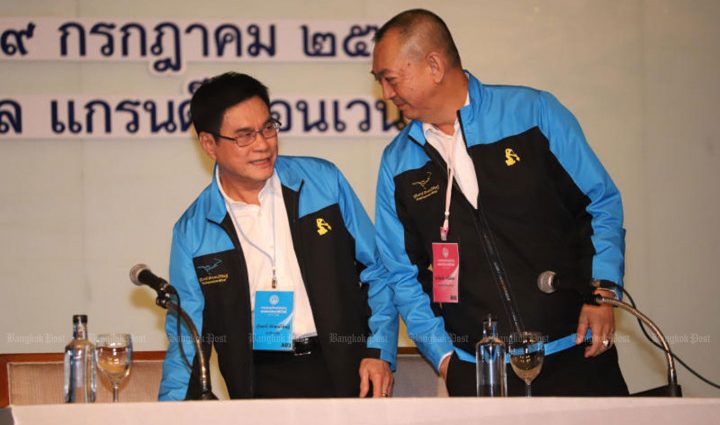Strong support from MPs could make him the front-runner if he enters Sunday’s contest
PUBLISHED : 8 Dec 2023 at 19:54

Chalermchai Sri-on says he has yet to decide whether to seek the leadership of the Democrat Party on Sunday, despite indications that his strong support among party MPs makes him a front-runner.
The acting secretary-general of the party was responding to reports that a faction of MPs, led by Dech-it Khaothong of Songkhla, would support Mr Chalermchai to become the new party leader instead of over acting deputy leader Narapat Kaewthong, as they believed Mr Chalermchai could help unify the party.
Mr Chalermchai said he would have to hold talks with these MPs because taking the helm is a big challenge. He added he had never expressed any ambitions for any post.
The Democrat Party is his home, he said, and he wants it to develop and prosper without any disruption.
“Let me talk to them first. Some party issues can’t be discussed in public,” he said.
Mr Narapat and Watanya “Madam Dear” Bunnag, chairwoman of the party’s political innovation committee, have announced their bids to run for party leadership on Sunday.
Ms Watanya on Friday confirmed her decision to vie for the top job even though some 21 MPs are said to support Mr Chalermchai. She said she offered an opportunity for the party to grow.
Asked if she would remain with the party if she lost the race, she said it depended on whether the party’s direction changes dramatically from the day she became a member.
“I’ll have to assess it first. If I don’t belong in the organisation, I will take this into consideration,” she said.
The Democrat Party has been without a leader since Jurin Laksanawisit stepped down in a show of responsibility following the party’s poor performance in the May 14 general election.
An internal disagreement over who should take the helm forced two meetings to elect a new leader to collapse due to a lack of quorum.
Under the party rules governing the leadership contest, an MP’s vote carries more weight than that of an ordinary party member, at a ratio of around 70 to 30. Thus, a candidate with strong MP support is more likely to secure a victory without any problems.

